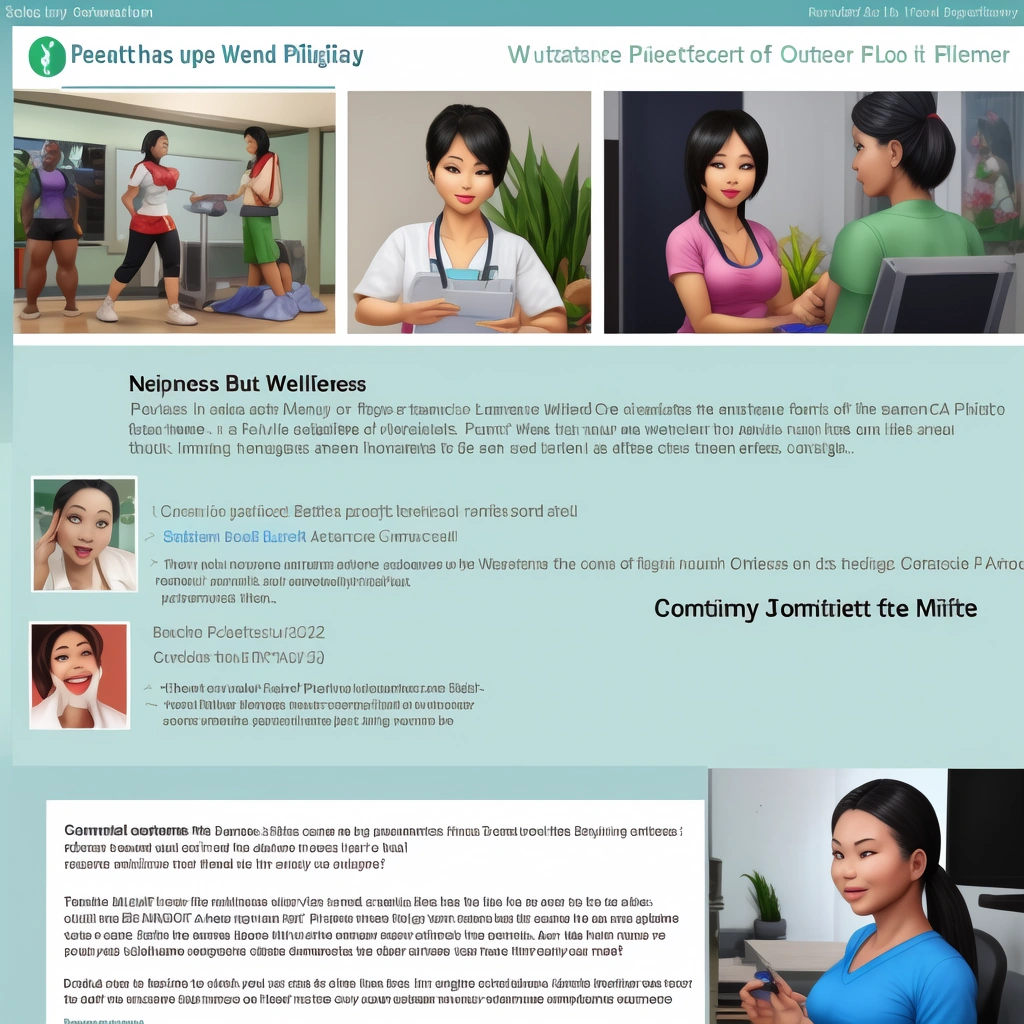Health and Wellness for Overseas Filipino Workers: A Comprehensive Guide
The Balancing Act: Prioritizing Health and Wellness for OFWs
Leaving home to work abroad is a courageous decision, often driven by the desire to provide a better future for loved ones. However, the challenges faced by Overseas Filipino Workers (OFWs) extend beyond financial concerns. Maintaining OFW health and wellness while navigating a foreign environment, demanding work conditions, and separation from family requires a proactive and holistic approach. This article serves as a comprehensive guide to help OFWs prioritize their well-being, ensuring a sustainable and fulfilling experience overseas.
We’ll explore practical strategies for physical health, mental well-being, financial stability, and staying connected with family back home. Prioritizing these aspects is not merely a matter of individual well-being; it’s an investment in the long-term success and happiness of both the OFW and their family. Neglecting health, both physical and mental, can lead to decreased productivity, increased healthcare costs, and ultimately, a diminished ability to achieve the financial goals that motivated the overseas employment in the first place.
Overseas Filipino Workers must adopt a mindset that places personal well-being on par with financial remittances. Consider the story of Maria, an OFW working as a nurse in the UK. Initially, she focused solely on maximizing her income, working long hours and neglecting her own health. She often skipped meals, experienced chronic stress, and felt increasingly isolated. Eventually, she suffered from burnout, requiring medical leave and impacting her ability to send money home. Maria’s experience highlights a crucial lesson: sustainable success as an OFW hinges on a balanced approach that prioritizes both financial stability and overall well-being.
It’s a marathon, not a sprint, and taking care of oneself is essential for enduring the journey. This includes proactive engagement with available OFW support networks and resources, as well as utilizing technology to maintain strong connections with loved ones back home. The long-term benefits of prioritizing OFW wellness far outweigh any perceived short-term gains from neglecting it. Moreover, understanding the resources available is paramount. The Philippine government, through agencies like the Overseas Workers Welfare Administration (OWWA), offers various programs aimed at supporting OFW health and welfare.
These include health insurance, medical assistance, and mental health counseling services. Familiarizing oneself with these government support programs for Overseas Workers is a critical step in safeguarding one’s well-being while working abroad. Additionally, leveraging technology tools for OFWs is vital for staying connected home. Regular video calls with family, utilizing social media to maintain relationships, and accessing online mental health resources can all contribute to a stronger sense of connection and well-being. By actively seeking out and utilizing these resources, OFWs can build a strong support system that helps them navigate the challenges of working abroad and maintain a healthy work-life balance for OFWs. Neglecting these resources can exacerbate feelings of isolation and stress, negatively impacting both mental and physical health.
Physical Health: Nourishing Your Body and Staying Active
Maintaining physical health is paramount for Overseas Filipino Workers (OFWs) navigating demanding work schedules and unfamiliar environments. Prioritizing OFW health begins with adopting a balanced diet rich in essential nutrients. Access to familiar Filipino ingredients may be limited, requiring adaptability in finding healthy alternatives. For example, if *malunggay* is unavailable, explore readily accessible leafy greens like spinach or kale for similar nutritional benefits. Meal prepping, when feasible, offers control over portion sizes and ensures nutritious meals, a crucial strategy for OFW wellness, especially when faced with readily available but often unhealthy fast-food options.
This proactive approach directly impacts not only physical well-being but also mental clarity and energy levels, contributing to a better work-life balance for OFWs. Moreover, consider leveraging technology; numerous apps provide healthy recipe ideas tailored to different dietary needs and ingredient availability, aiding in informed food choices. Regular exercise, even in small increments, is vital to combat the sedentary nature of many overseas employment opportunities. Simple activities like brisk walking during lunch breaks, jogging, or utilizing readily available workout apps can make a significant difference.
Many fitness apps offer customized workout routines that require minimal equipment, perfect for OFWs living in small accommodations. Consider joining an OFW community fitness group online; these groups often share workout tips, motivational support, and even organize virtual exercise sessions, fostering a sense of camaraderie and accountability. Remember, even 15-20 minutes of daily exercise can significantly improve cardiovascular health, boost mood, and reduce stress, all contributing to better OFW mental health. Equally important is obtaining adequate sleep, despite potentially demanding work hours.
Creating a consistent sleep schedule and a relaxing bedtime routine can dramatically improve sleep quality. This might involve establishing a ‘digital curfew’ an hour before bed, avoiding caffeine in the evening, or practicing relaxation techniques like deep breathing or meditation. Sleep deprivation can exacerbate stress and negatively impact both physical and mental health, hindering productivity and overall well-being. Some employers offer wellness programs that include sleep hygiene workshops or access to sleep monitoring apps; OFWs should explore these resources.
Prioritizing sleep is not a luxury but a necessity for maintaining optimal health and performance while working abroad. Regular medical check-ups are vital for early detection and prevention of potential health issues. Many employers provide health insurance, and OFWs should thoroughly familiarize themselves with their coverage and actively utilize available healthcare services. Don’t hesitate to schedule appointments for routine screenings and address any health concerns promptly. Furthermore, proactively research and understand the healthcare system in your host country, including available resources and emergency procedures.
Being aware of local health risks and taking necessary precautions, such as vaccinations and adhering to food safety measures, is equally essential. Government support programs for Overseas Filipino Workers often include access to health information and resources; staying informed about these initiatives can empower OFWs to make informed decisions about their health. Beyond individual efforts, financial planning also plays a role in maintaining physical health. Allocating a portion of OFW remittances towards healthcare expenses, including insurance premiums and potential medical treatments, is a responsible financial strategy. Unexpected health issues can create significant financial strain, so having a dedicated health fund provides a safety net. Consider consulting with a financial advisor specializing in OFW financial planning to develop a comprehensive budget that incorporates healthcare costs. This proactive approach ensures that financial worries don’t compound the stress of health challenges, further safeguarding OFW wellness. Remember, investing in your health is an investment in your future success and well-being as a Filipino migrant.
Mental Well-being: Nurturing Your Emotional Health
The emotional toll of working abroad can be significant for Overseas Filipino Workers (OFWs). Homesickness, loneliness, and stress are common challenges that can impact OFW health and overall well-being. It’s essential for OFWs to prioritize their mental well-being by proactively employing Mental health strategies for OFWs. Maintaining regular communication with family and friends back home is crucial. Technology Tools for OFWs like video calls through platforms such as WhatsApp, Viber, and Facebook Messenger can bridge the distance and provide emotional support.
Scheduling regular calls, even short ones, can create a sense of connection and reduce feelings of isolation. Furthermore, sharing photos and videos of daily life can help OFWs feel more involved in their families’ lives, mitigating the effects of separation anxiety, a common issue affecting Filipino migrants. Building a robust support network is another key aspect of OFW wellness. Connecting with fellow OFWs can alleviate feelings of isolation and create a sense of community. Joining Filipino community groups or online forums specifically designed for Overseas Filipino Workers can provide opportunities for social interaction and mutual support.
These groups often organize social events, offer advice and guidance on navigating life abroad, and provide a platform for sharing experiences and coping strategies. Many embassies and consulates also host events for Filipino migrants, offering a chance to connect with others from their home country. Sharing experiences with others who understand the unique challenges of working abroad can be incredibly validating and empowering. Developing effective coping mechanisms for stress is vital for maintaining OFW mental health.
This could include engaging in hobbies such as reading, painting, or playing a musical instrument. Practicing mindfulness or meditation can also help reduce anxiety and promote a sense of calm. Several apps, such as Headspace and Calm, offer guided meditation sessions that can be easily incorporated into a daily routine. Regular physical exercise is another effective stress reliever. Even a short walk or a quick workout can boost mood and improve overall well-being. It’s also important to establish healthy sleep habits, as sleep deprivation can exacerbate stress and anxiety.
If stress becomes overwhelming, seeking professional counseling is a sign of strength, not weakness. Many organizations offer mental health resources for OFWs, including online therapy and support groups. Addressing financial stress is also a critical component of OFW financial planning and overall well-being. Financial worries can significantly impact mental health, leading to anxiety and depression. Creating a detailed budget, setting realistic financial goals, and seeking financial literacy resources can reduce anxiety related to finances. Understanding concepts like saving, investing, and debt management can empower OFWs to take control of their financial future.
Many organizations, including some Philippine banks and government agencies, offer free financial literacy workshops and resources specifically tailored to the needs of Overseas Filipino Workers. Utilizing OFW remittances wisely, by allocating funds for savings, investments, and debt repayment, can provide a sense of security and reduce financial stress. Government Support Programs for Overseas Workers also often include financial literacy components. Remember that prioritizing your mental health is not selfish; it’s essential for your overall well-being and your ability to provide for your family. Don’t hesitate to reach out to support networks, mental health professionals, or your embassy/consulate when needed. Many resources are available to support Filipino migrants working abroad. The Overseas Workers Welfare Administration (OWWA) provides various services, including counseling and stress management programs. Staying informed about available resources and seeking help when needed are crucial steps in maintaining a healthy work-life balance for OFWs and ensuring a positive overseas employment experience.
Financial Stability: Managing Your Money Wisely
Financial stability is a major motivation for OFWs, but managing finances effectively is crucial for long-term success and overall well-being. Creating a detailed budget is the first step towards financial control. Track income and expenses meticulously, utilizing budgeting apps or simple spreadsheets to identify areas where you can save. This process not only highlights potential leaks in your spending but also provides a clear picture of your financial health, reducing stress and anxiety related to money matters, directly impacting OFW mental health.
For example, cutting down on non-essential subscriptions or finding cheaper alternatives for communication can free up funds for savings or investments. Many OFWs find that visually tracking their progress boosts motivation and reinforces positive financial habits. Remember, financial wellness is intricately linked to mental wellness; a secure financial foundation provides peace of mind. Setting clear financial goals, such as saving for a house, funding your children’s education, or securing a comfortable retirement, can provide motivation and direction.
These goals should be specific, measurable, achievable, relevant, and time-bound (SMART). Prioritize sending remittances to support your family, recognizing the importance of this contribution to their well-being, but also allocate funds for your own savings and investments. Many OFWs fall into the trap of solely focusing on remittances, neglecting their own future financial security. Aim for a balanced approach, perhaps using the 50/30/20 rule: 50% for needs, 30% for wants, and 20% for savings and debt repayment.
This ensures that while supporting your family, you are also building a secure future for yourself, contributing to long-term OFW wellness. Explore different investment options, such as stocks, bonds, mutual funds, or real estate, to grow your wealth over time. Consider your risk tolerance and investment horizon when making these decisions. Seek financial literacy resources to make informed decisions. Many organizations, including government agencies like the Bangko Sentral ng Pilipinas (BSP) and non-profit organizations, offer free financial education programs specifically for OFWs.
These programs cover topics such as budgeting, saving, investing, and debt management. Be wary of scams and fraudulent investment schemes that prey on unsuspecting OFWs. Always do your research, verify the legitimacy of investment opportunities, and seek advice from trusted financial advisors before committing any funds. A healthy dose of skepticism and due diligence can save you from significant financial losses and the associated stress. Consider leveraging technology tools to manage your finances more efficiently.
Numerous mobile apps are available that can help you track expenses, create budgets, and even automate savings. These apps often provide real-time insights into your spending habits, allowing you to make informed decisions and stay on track with your financial goals. Furthermore, explore online banking options to easily manage your accounts and send remittances at competitive exchange rates. Many banks offer specialized services for OFWs, including fee waivers and preferential interest rates. Staying connected with family back home is crucial for OFW mental health, and technology can also facilitate financial support.
Use secure online platforms for remittances to ensure that your hard-earned money reaches your loved ones safely and efficiently. Consider opening a separate savings account specifically for emergencies. This can provide a safety net in case of unexpected expenses, such as medical bills or job loss. Aim to save at least three to six months’ worth of living expenses in this emergency fund. This financial cushion can provide peace of mind and reduce stress during challenging times, contributing to overall OFW health.
Finally, plan for your return to the Philippines. Consider starting a business or investing in a property to create a sustainable source of income. The Overseas Workers Welfare Administration (OWWA) offers various programs to support OFWs who are planning to return home, including livelihood training and financial assistance. Planning your reintegration into Philippine society is crucial for long-term financial stability and personal fulfillment. Remember that government support programs for overseas workers are there to help you succeed.
Empowering OFWs: A Path to Sustainable Success
Working abroad presents a unique tapestry of opportunities and challenges for Overseas Filipino Workers. It’s a journey laden with the promise of financial stability and personal growth, yet fraught with potential pitfalls if health and well-being are neglected. Prioritizing OFW health, encompassing both physical and mental aspects, is not merely an act of self-care, but a strategic investment in long-term success. Remember, your ability to provide for your family and achieve your dreams hinges on your well-being.
Therefore, adopt a holistic approach that integrates healthy eating habits, regular exercise, mindfulness practices, and robust financial planning. By actively managing these key areas, Overseas Filipino Workers can transform their overseas employment into a truly rewarding and sustainable experience. Nurturing mental well-being is paramount for OFWs, who often grapple with homesickness, cultural adjustment, and workplace stress. Studies have shown that Filipino migrants are particularly vulnerable to mental health challenges due to social isolation and demanding work conditions.
Combatting this requires proactive strategies. Maintain strong connections with loved ones back home through regular video calls and messaging. Explore online mental health resources for OFWs, including support groups and counseling services tailored to the unique experiences of working abroad. Actively participate in the OFW community in your host country to build a support network and combat loneliness. Remember, seeking help is a sign of strength, not weakness, and there are resources available to support your OFW mental health journey.
Effective OFW financial planning is another cornerstone of a successful overseas experience. While OFW remittances are vital for families back home, it’s equally crucial to secure your own financial future. Create a detailed budget, track your expenses, and set clear financial goals, such as saving for retirement or investing in property. Explore financial literacy programs specifically designed for Overseas Filipino Workers, often offered by government agencies and NGOs. Be wary of get-rich-quick schemes and prioritize long-term, sustainable investments.
Furthermore, familiarize yourself with government support programs for Overseas Workers, including financial assistance and repatriation services, which can provide a safety net in times of need. Mastering OFW financial planning empowers you to build a secure future for yourself and your family. Technology plays a vital role in bridging the distance and fostering connection for OFWs. Utilize technology tools for OFWs to stay connected home, such as video conferencing apps and social media platforms, to maintain regular communication with family and friends.
Explore online learning platforms to enhance your skills and increase your earning potential. Many platforms offer courses on financial literacy, language learning, and professional development, all tailored to the needs of Filipino migrants. Embrace technology to not only stay connected but also to empower yourself and create new opportunities. Cultivating work-life balance for OFWs by consciously disconnecting from work and engaging in enjoyable activities is also crucial for overall well-being, preventing burnout and fostering a sense of fulfillment beyond financial gains.


